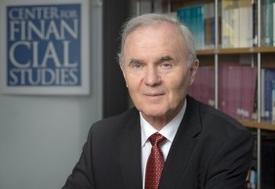Otmar Issing
( economist) | ||||||||||||
|---|---|---|---|---|---|---|---|---|---|---|---|---|
 | ||||||||||||
| Born | 27 March 1936 Würzburg, Germany | |||||||||||
| Nationality | German | |||||||||||
| Alma mater | University of Würzburg | |||||||||||
| Member of | Goldman Sachs/International Advisors | |||||||||||
Triple Bilderberger European central banker who became "international advisor" for Goldman Sachs.
| ||||||||||||
Otmar Issing is a German economist who was member of the Executive Board of the European Central Bank from 1998 to 2006 and concurrently as ECB chief economist. He developed the 'two-pillar' approach to monetary policy decision-making that the ECB has adopted.
After leaving the the financial regulator ECB, Issing became an "international advisor" for Goldman Sachs.[1] He attended the 1997, 1998 and 1999 Bilderberg meetings.
Contents
Education
Issing studied economics at the University of Würzburg from 1955 until 1960 with temporary studies in London and Paris. From 1960 to 1966 he worked as a research assistant at the University of Würzburg. He received his PhD in 1961 and his postdoctoral lecture qualification (habilitation) in 1965.[2]
Career
In 1967 Issing became director of the Institute for International Economic Relations at the University of Erlangen-Nuremberg and full professor at the faculty of economics and social sciences of the University of Erlangen-Nuremberg. In 1973 he was appointed Professor of Economics, Monetary Affairs and International Economic Relations at the University of Würzburg.[2]
From 1988 to 1990 Issing was a member of the German Council of Economic Experts and in 1990 he became a member of the board of the Deutsche Bundesbank with a seat on the Central Bank Council. In 1998 Issing became a member of the executive board of the European Central Bank, responsible for the Directorates General Economics and Research as well as its first Chief Economist.
In June 2006 Issing became president of the Center for Financial Studies (CFS) at the Goethe University in Frankfurt am Main and from 2007 until 2018 he was an international advisor to Goldman Sachs.[2]
In October 2008 Issing chaired a German government expert group on the new financial order that drew up proposals on how to reform international financial markets (also known as "Issing Commission"). The group published six reports. In 2008 Issing was also a member of the high level group of the European Commission on financial supervision in the EU chaired by Jacques de Larosière. He was a Member of the G20 Eminent Persons Group on Global Financial Governance, which was formally established by G20 Finance Ministers and Central Bank Governors for the period 2017–2018.[2]
Since April 2013, Otmar Issing has been working as an ambassador for the neoliberal lobbyist New Social Market Economy initiative.
Positions
Issing was critical on the premature start of European Monetary Union with a large group of heterogenous countries. He warned EU member states not to violate the no-bailout clause that prohibits the assumption of liability for other countries' debts.[3]
In October 2016 Issing warned that the Stability and Growth Pact was near to failure, there was no market discipline because of ECB interventions and no fiscal control mechanism from markets or politicians. The ECB had "crossed the Rubicon" and was in an untenable position, struggling to carry out its conflicting roles as agent of monetary policy, banking regulator, and Troika enforcer. Noting that the bank already held over €1 trillion of bonds bought at artificially low or negative yields, so would face great losses when interest rates rise again, he warned. The reputational risk of such actions by a central bank would have been unthinkable in the past." His conclusion was that in its current form the euro project was unworkable and one day would collapse.[4]
Corporate boards
- Deloitte Germany, Member of the Advisory Board[5]
- Goldman Sachs, Member of the International Advisory Council (since 2006)[6][7]
NGOs
- Berggruen Institute, member of the Council for the Future of Europe[8]
- European Academy of Sciences and Arts, member
- Friedrich August von Hayek Foundation, member of the board of trustees[9]
- Gesellschaft für Kapitalmarktforschung, chairman of the board of trustees
- House of Finance at Goethe University Frankfurt, chairman of the board of trustees
- International Finance, member of the editorial board[10]
- Leibniz Institute for Financial Research, member of the board of trustees[11]
- Bocconi University, member of the International Advisory Council (until 2015)
Events Participated in
| Event | Start | End | Location(s) | Description |
|---|---|---|---|---|
| Bilderberg/1997 | 12 June 1997 | 15 June 1997 | US Lake Lanier Georgia (State) | The 45th Bilderberg meeting |
| Bilderberg/1998 | 14 May 1998 | 17 May 1998 | Scotland Turnberry | The 46th Bilderberg meeting, held in Scotland, chaired by Peter Carrington |
| Bilderberg/1999 | 3 June 1999 | 6 June 1999 | Portugal Sintra | The 47th Bilderberg, 111 participants |
| WEF/Annual Meeting/2004 | 21 January 2004 | 25 January 2004 | Switzerland WEF | 2068 billionaires, CEOs and their politicians and "civil society" leaders met under the slogan Partnering for Prosperity and Security. "We have the people who matter," said World Economic Forum Co-Chief Executive Officer José María Figueres. |
References
- ↑ https://lobbypedia.de/wiki/Otmar_Issing
- ↑ Jump up to: a b c d https://www.ecb.europa.eu/press/conferences/ecbforum/previous_fora/2014/html/biographies/issing.en.html
- ↑ https://www.ecb.europa.eu/press/key/date/2001/html/sp010223.en.html
- ↑ https://www.linkedin.com/pulse/why-euro-architect-issing-believes-house-cards-set-collapse-jeffery
- ↑ Advisory Board Deloitte.
- ↑ Goldman Sachs: Otmar Issing wird Investmentbanker Frankfurter Allgemeine Zeitung, 16 October 2006.
- ↑ Tom Braithwaite (7 October 2013), Zoellick joins Goldman Sachs as adviser Financial Times.
- ↑ Council for the Future of Europe Berggruen Institute.
- ↑ Board of Trustees Friedrich August von Hayek Foundation.
- ↑ Editorial Board International Finance.
- ↑ Board of Trustees Leibniz Institute for Financial Research.
Wikipedia is not affiliated with Wikispooks. Original page source here